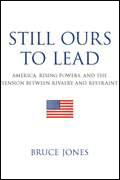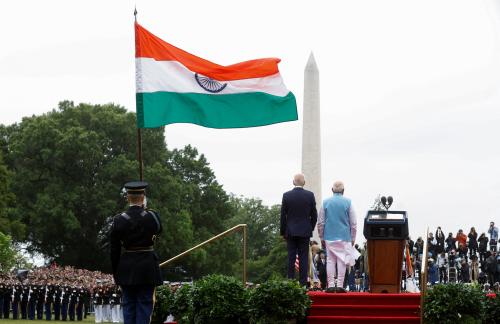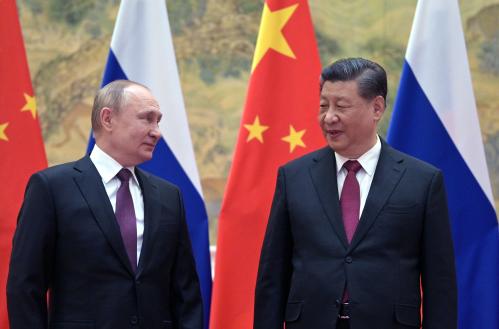 “Still Ours to Lead is not the Beatles’ White Album, but to those interested in global cooperation, it’s mind-blowing nonetheless,” writes Elizabeth Cobbs Hoffman in her recent Times Higher Education review of Bruce Jones’ Still Ours to Lead: America, Rising Powers, and the Tension Between Rivalry and Restraint (Brookings Institution Press, 2014).
“Still Ours to Lead is not the Beatles’ White Album, but to those interested in global cooperation, it’s mind-blowing nonetheless,” writes Elizabeth Cobbs Hoffman in her recent Times Higher Education review of Bruce Jones’ Still Ours to Lead: America, Rising Powers, and the Tension Between Rivalry and Restraint (Brookings Institution Press, 2014).
In his book, Jones, a Brookings senior fellow and director of the Project on International Order and Strategy, examines the tension between the impulse to rival the United States and the incentives for restraint and cooperation among the rising powers. Both are alive and well in the current system, and the balance provides a continued ability to solve problems and to manage crises at roughly the same rate as when American dominance was unquestioned. Maintaining that balance, Jones argues, is central to the question of whether we will live in a stable or unstable system in the period to come. This challenge happens to play to America’s unique strength—its unparalleled ability to pull together broad and disparate coalitions for action. To succeed, America will have to adapt its leadership to new realities.
Hoffman writes that:
Underneath this book’s nondescript cover is an incredibly lucid analysis of our topsy-turvy world, and a hard-headed but optimistic vision of its future. For Bruce Jones, the globe has finally achieved what Churchill and Roosevelt only dreamed of: a liberal trading order with nearly universal buy-in.
Unforced and uncoerced, “rising powers” such as India, Mexico, Turkey and China “have repeatedly demonstrated that they do not seek to break the international order but rather to profit from it and to take a turn at the helm of major international institutions”. All have a stake in freer trade, open waterways, stable borders and sound money. Rising powers have found that “conflict and collapse are absolutely bad for business”.
There are few victims here, Jones implies. In the first 40 years of the Cold War, the BRIC countries (Brazil, Russia, India and China) stayed on the sidelines of the global financial system. Suspicious of capitalism and Western motives, they experimented with alternative models. As it turned out, “their economies stagnated while those of the West (and of Western allies like Japan and South Korea) took off”. They and others shifted orientation and jumped “headfirst” into global trade.
However, in recent years, more countries have accrued GDPs above a trillion dollars, contributing to a decrease in global poverty. Hoffman remarks that “all this occurred because the U.S. backed an open system in which onlookers could join, compete and rise.” This recent rise in countries’ fortunes has “created new leadership opportunities,” prompting countries to “seek to shape, not replace, the system.”
Responding to the frequently discussed notion of an America in decline, Hoffman argues that “Jones demolishes the myth of decay.” Instead, she suggests, “Still Ours to Lead explores how the U.S. can creatively influence the system it wished for, and now has.” Hoffman concludes with another nod to the Beatles. She remarks that “for a slim, plain book, Still Ours to Lead has remarkable depth and breadth. It takes readers down multiple surprising pathways. Rather like the White Album. Listen.”



Commentary
Reviewer: Still Ours to Lead Not Beatles’ White Album, but Mind-blowing Nonetheless
July 11, 2014